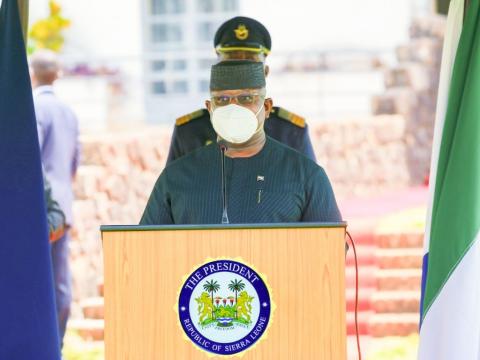By Mohamed Jaward Nyallay
People across Sierra Leone can today start travelling to any part of the country following a presidential declaration on Tuesday ending over two months of a blockade imposed as part of measures to curb the ongoing Covid-19 pandemic.
The end of the inter-district lockdown is among several relaxations of the measures announced by President Julius Maada Bio at a special press conference held at State House. Bio said the move was part of a process of steadily easing the restrictions with the aim of getting the country back to normalcy.
Public and private transportation services will resume without any security passes, the president announced.
The restriction on travelling from one district to another was first instituted on April 12th this year, following the country’s announcement of its index case of the pandemic.
President Bio said it was necessary for the country to slowly get back to normalcy, noting that as a government they have to strike the balance between fighting the pandemic and ensuring that the economy thrives.
“The fight against COVID is a fight between livelihood and life, it has to be measured. We can come back any day as we observe the data to make adjustments as and when necessary,” Bio said.
“We should not kill the economy, especially in the region by continuing to maintain the rigid or hard lockdown that we have put in place,” he added.
Bio also announced that a regional dialogue among Mano River Union countries will soon take place via Zoom to discuss a regional approach to reopening international borders.
Businesses are perhaps the worst affected sector by the policy, with traders spending more than the usual cost to transport their goods to the capital, Freetown and other areas in the country. This has impacted prices, especially on locally produced goods.
As part of the President’s announcement on Tuesday, he also relaxed a 10-hour curfew. The new time for the curfew now is 11pm to 6am, two hours, from 9pm to 6am.
Edna, a retail cosmetic dealer at Wilberforce Street, praised the idea of relaxation of the curfew time. She said the previous time meant she had to pay two times more transport fare to get home in time.
“When it’s time to get home, I used to pay as much Le10, 000 for a distance that I am supposed to pay Le5, 000. We really appreciate the move to ease the curfew.”
“The current time will benefit us a lot as business people,” she added.
Her excitement about the new curfew time and her constraint about the previous one is a reflection of what many more people across the country have been going through.
The ease of restrictions has come with a lot of caution from the government, following weeks of public concerns about the potential effect.
Speaking on the end of the inter- district lockdown, Head of the country’s National COVID-19 Emergency Response Center (NACOVERC), Rtd Brig. Kellie Hassan Conteh, said public vehicles would be expected to implement measures like the use of facemask and social distancing.
In addition to that, Kellie said all drivers will be required to have a manifest containing information on passengers they are carrying.
“No vehicle will be allowed to travel with passengers without a manifest. Vehicles travelling upcountry must have a manifest with details of the driver and all the passengers submitted at Mile 38,” Kellie said.
“All passengers within the vehicle must have their facemasks worn properly. Passengers without facemasks in those vehicles will not be allowed to cross,” he added.
On social distancing, Kellie said he expected drivers to take less passengers than normal to make sure social distancing is practiced.
“We want them to space out, we cannot dictate that now because there are different type of vehicles,” the NACOVERC boss told Politico later.
Some drivers in the capital, Freetown, have resisted calls to take fewer passengers in vehicles to practice social distancing, especially bus drivers. Their action has also been aided by the acute shortage of public transportation in the city.
Brig. Kellie said drivers must obey social distancing rules.
“They will lose more money, but that is the sacrifice we all have to make. Our health system should be the priority; it should dictate what we do. Otherwise we close it up.”
Whiles expressing his excitement, President of the Sierra Leone Drivers and General Transport Workers Union, Alpha Amadu Bah, said they will be in all parks across the country from Wednesday to make sure all government laws are obeyed by drivers.
He explained to Politico a breakdown of their plans that will require drivers to practice social distancing.
“Poda-poda and Mazda vehicles should just take three per seat. Sprinter should just take four per seat, because they use to take five; we just want one person seating at the front instead of two. Buses should not have middle seat,” Bah explained.
Opening of the roads to the provinces is set to put pressure on District COVID-19 Emergency Response Centers (DICOVERCS). There is a danger of an upsurge in cases, especially in districts where case numbers have been low.
The DICOVERCs have also complained about the late disbursement of operational funds, which the NACOVERC boss said has now been rectified.
Minister of Health and Sanitation, Dr Alpha Wurie, said the country has the capacity to do as much as 450 tests per day. Dr Wurie said they also plan to do rigorous contact tracing in response to any upsurge in cases.
“We can respond to any spike in cases, in Falaba they have gone 30 days without a case. That has shown us that we can control transmission in certain areas,” he said.
Kellie also said details like phone number of passengers will be crucial in their efforts to do contact tracing, in the case of an upsurge in cases.
Copyright © 2020 Politico Online








